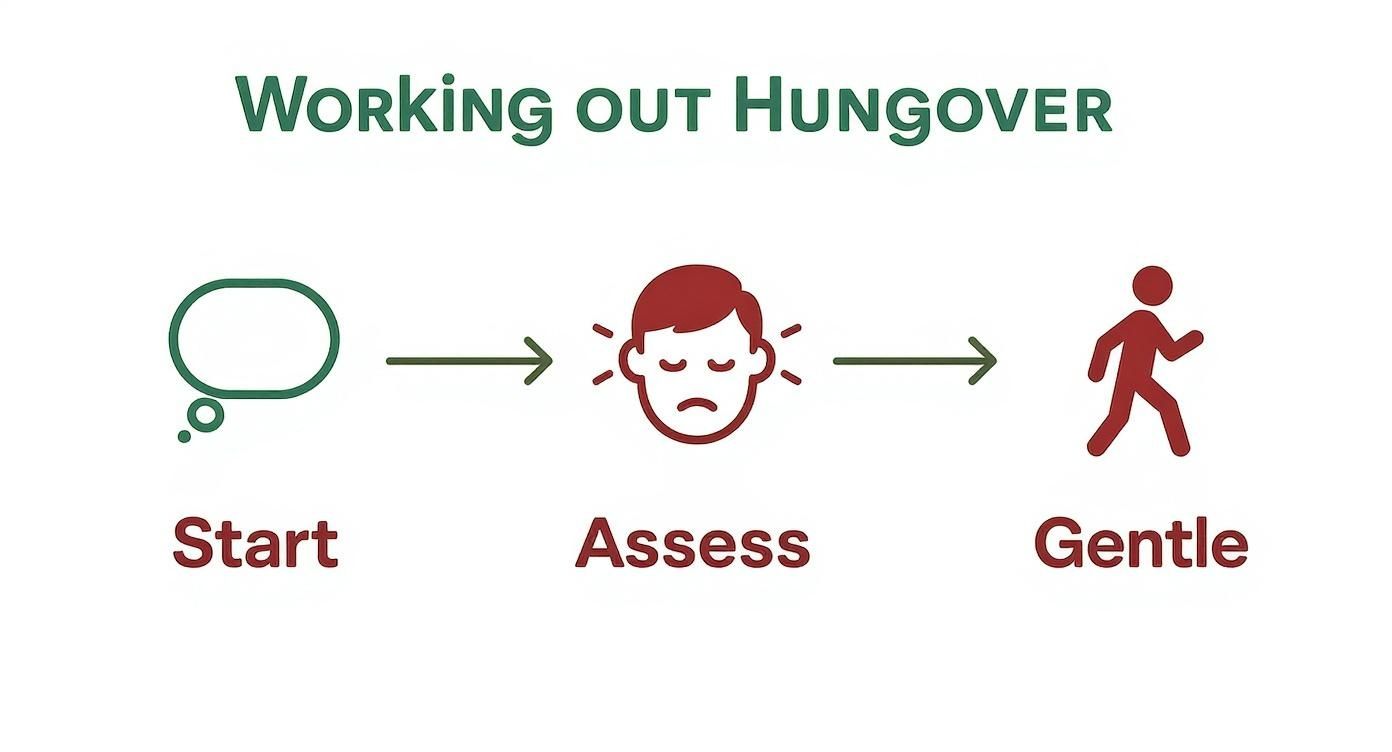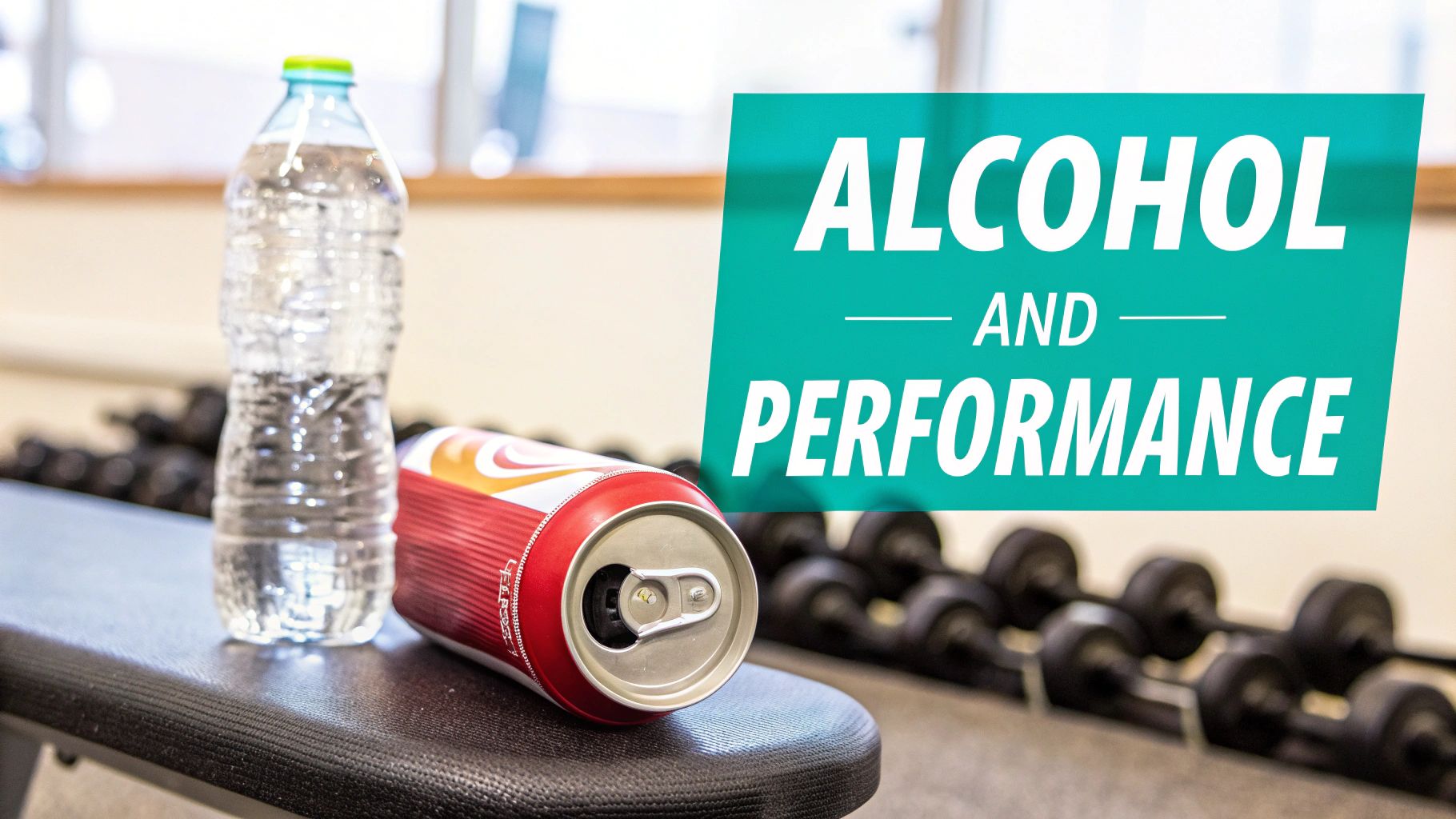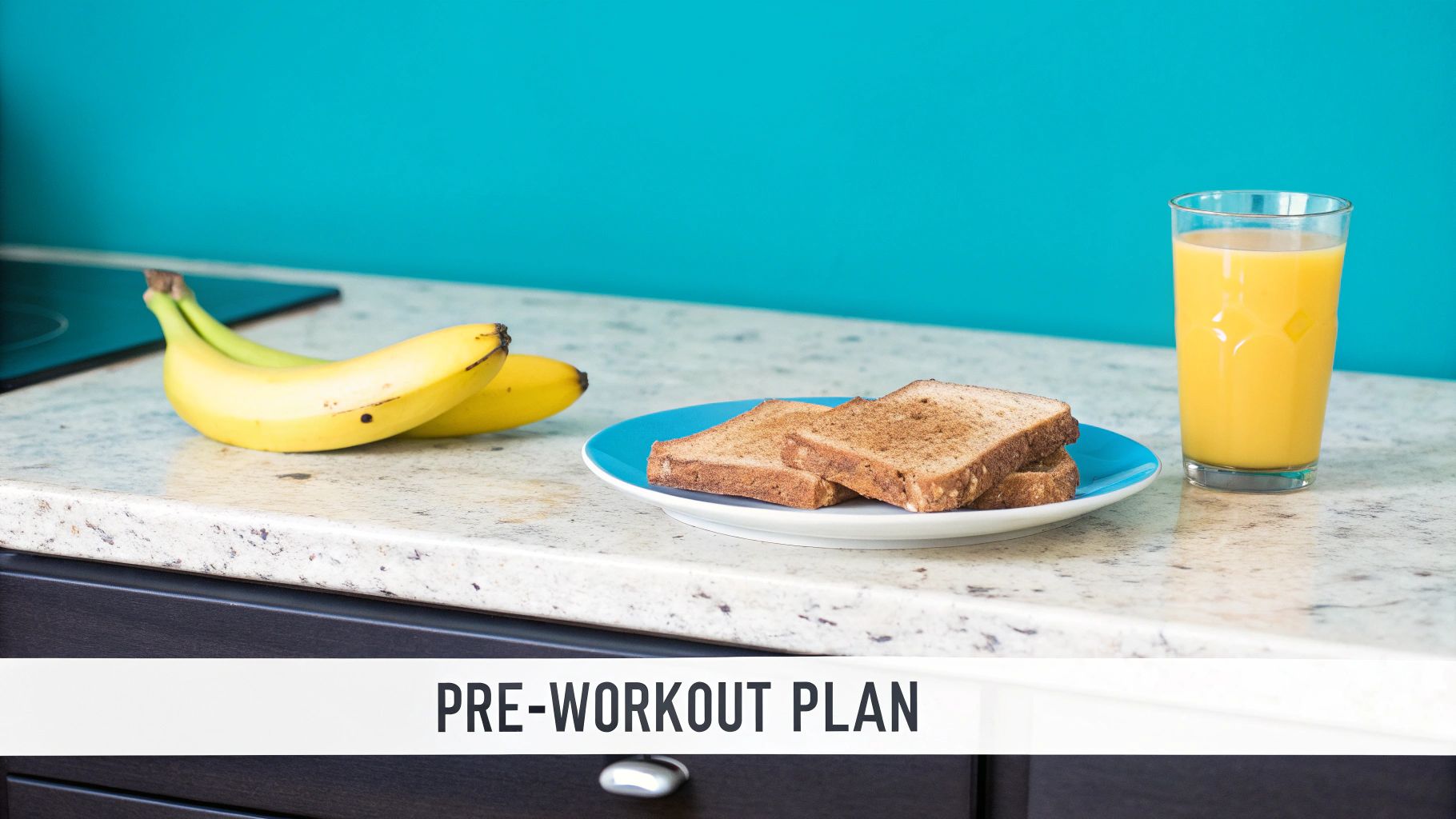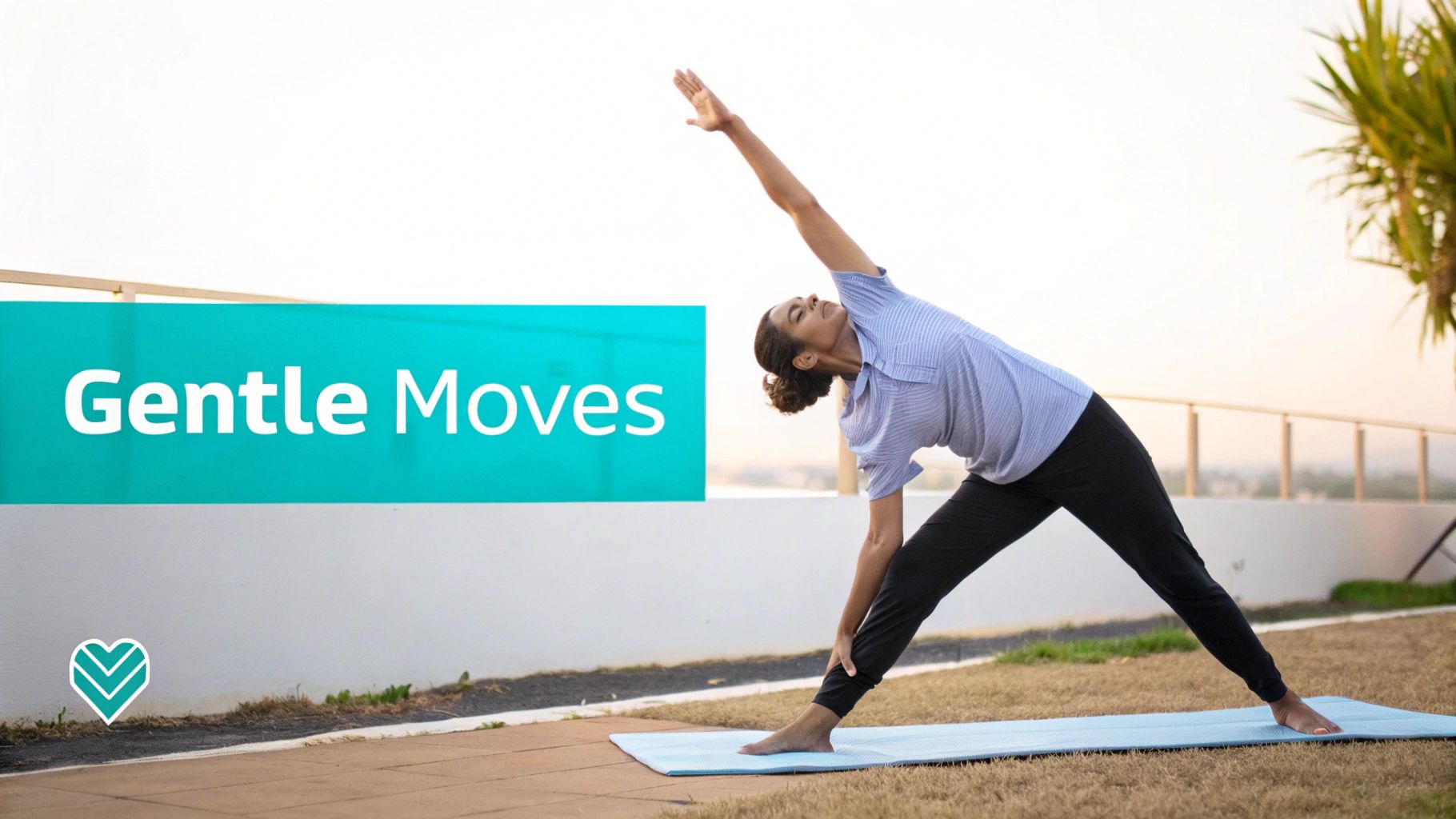

· By Annemarie
Working Out When Hungover Your Ultimate Guide
So, you're wondering if you can drag yourself to the gym after a long night out. The short answer is yes, you can exercise with a hangover, but—and this is a big but—you have to be smart about it. This is not the time to push for a new personal record. Instead, think gentle, restorative movement.
The Truth About Working out When Hungover
Let's get one thing straight: the idea of "sweating out" a hangover is a total myth. While some light movement might clear your head a bit, it’s not magically flushing toxins out of your system.
Your body is already dealing with a lot—dehydration, inflammation, and probably some pretty terrible sleep. Pushing it too hard is just asking for trouble. So, the real question isn't if you should work out, but how you should approach it based on how you're feeling.
Assess Your Hangover Severity
Be honest with yourself here. A mild headache is a world away from a full-blown, can't-peel-yourself-off-the-couch hangover. No matter what, a high-intensity workout is completely off the table. Your body just isn't up for it.
In fact, research shows that hangovers seriously tank your exercise capacity. One study found that people who were hungover reported feeling way more exhausted during a simple strenuous walk. You can read the full research on how hangovers impact physical performance to see just how much it affects you.
This little guide should help you figure out what to do next.

The takeaway is pretty clear: if you’re dealing with severe symptoms, your only job is to rest and rehydrate. Gentle movement is only on the table if you're dealing with the milder after-effects.
The real objective of working out when hungover is to aid recovery, not to punish your body. Think of it as a gentle nudge toward feeling human again, focusing on light activity that boosts circulation and mood without adding extra stress.
If you do decide to get moving, keep these things in mind:
- Dehydration Level: Feeling dizzy or ridiculously thirsty? You need to address that with water and electrolytes before you even think about moving.
- Nausea: Any kind of stomach upset is a hard no. That's your body telling you to stay put and rest.
- Coordination: Alcohol can mess with your motor skills long after you've stopped drinking. If you feel clumsy or off-balance, skip any exercises that require precision.
Workout Intensity Guide Based On Hangover Severity
Sometimes it's hard to judge what "gentle" really means when your head is pounding. Use this quick guide to match your activity level to how you're actually feeling, ensuring you help your body, not harm it.
| Hangover Severity | Recommended Activity | Key Focus |
|---|---|---|
| Mild (Slight Headache, Tired) | Light cardio (walking, slow cycling), yoga/stretching. | Boosting circulation and mood. |
| Moderate (Headache, Fatigue, Mild Nausea) | Very gentle walk, light stretching. Or just rest. | Listening to your body, prioritizing hydration. |
| Severe (Pounding Headache, Nausea, Dizziness) | Complete rest. | Rehydration and sleep. Absolutely no exercise. |
Ultimately, the goal is to feel better, not worse. There's no shame in taking a rest day—your body will thank you for it.
How Alcohol Hijacks Your Workout Performance

Before you even think about lacing up your sneakers after a night out, it's worth knowing the physiological battle your body is already losing. Alcohol is a diuretic, which is just a scientific way of saying it makes you pee a lot more than usual. This quickly spirals into dehydration.
We're not just talking about being thirsty. When you're dehydrated, your blood actually thickens, forcing your heart to work overtime just to pump it around your body. Your muscles, desperate for oxygen and water, are way more likely to cramp up and tap out early.
So when you're considering a workout while hungover, you're already starting from a major deficit. That exhaustion you're feeling isn't just in your head; it's a full-body crisis. To get the full picture on what’s happening inside, check out our guide on what causes hangovers.
Your Energy and Muscle Repair are Tanked
It's not just about water, either. Alcohol directly messes with your liver's ability to produce glucose, which is your body's main energy source. This can lead to low blood sugar, explaining why you might feel shaky, weak, and just plain sluggish.
On top of that, booze throws a wrench into muscle protein synthesis. This is the all-important process your body uses to repair and rebuild your muscles after you work them. With this system offline, any exercise you manage to do is far less effective, and your recovery will take a whole lot longer.
Trying to crush a high-intensity workout with a hangover isn't a sign of mental toughness. It’s just a bad strategy. You’re ignoring your body’s compromised state, cranking up your risk of injury, and getting almost none of the muscle-building benefits.
The impact isn't just theoretical; it's measurable. Studies have shown that aerobic capacity—a key marker of fitness—can plummet by around 11% when you exercise with a hangover.
When you put it all together, you’re asking your body to perform at its best while actively robbing it of the hydration, fuel, and repair tools it desperately needs to even function. It's a recipe for a miserable, and potentially dangerous, workout.
Your Smart Pre-Workout Hangover Plan

Okay, so you've weighed the options and decided a light workout is actually doable. Great. But how you prep for it is everything.
Just rolling out of bed and into your gym shoes can make you feel a hundred times worse. A little bit of planning, on the other hand, can make this a genuinely restorative session. This isn’t about being a hero; it's about giving your body what it desperately needs.
The number one priority? Dehydration. Your body is screaming for fluids, so start sipping on water the moment you wake up. But honestly, plain water might not cut it after a big night out.
Rehydrate and Refuel Intelligently
To really tackle that dehydration, you need to bring back the electrolytes you’ve lost—we’re talking essential minerals like potassium and sodium. This is where an electrolyte drink or even some coconut water will do you a lot more good than just H₂O. They help your system actually absorb and hang onto the fluids, which is critical before you even think about breaking a sweat.
Next up is food. Try to get a small, simple meal in about 60-90 minutes before you start moving. That weak, shaky feeling is often just your blood sugar crashing.
The goal here is simple: quick, easy energy that won't make your sensitive stomach revolt. This is absolutely not the time for a big, greasy breakfast.
Think about grabbing a banana, a slice of plain toast, or a small bowl of oatmeal. They’re packed with simple carbs that will help get your blood sugar back on track and give you a bit of fuel to work with. For more gentle options, check out this guide on what to eat when hungover.
And last, be real with yourself. Today’s goal isn’t to hit a new PR. It's just to get the blood flowing and feel a little more human again. Listen to what your body is telling you, and don't be afraid to call it quits if you start feeling dizzy or sick.
The Best and Worst Exercises for a Hangover

When you're trying to figure out if you should work out with a hangover, the type of exercise you choose makes all the difference. It's the deciding factor between feeling a little more human and making everything a whole lot worse.
This is not the time to push through the pain. Forget any ideas about a high-intensity session to "sweat it out." Your coordination is probably off, you're definitely dehydrated, and your energy is at an all-time low. Pushing yourself is not just miserable—it's risky.
Embrace Restorative Movement
The real goal here is gentle stimulation. You want to pick activities that get the blood flowing and release some feel-good endorphins without demanding too much from your already stressed-out system.
Here are your best bets:
- A Slow Walk: Never underestimate the power of fresh air. A leisurely 20-30 minute walk can clear your head and boost circulation without feeling like a chore.
- Gentle Yoga or Stretching: Stick to restorative poses that gently lengthen your muscles and help you relax. Now is not the time for hot yoga or a demanding power flow. Think more "lying on the floor and breathing" and less "impressive pretzel poses."
- Easy Stationary Biking: A slow, steady pace on a stationary bike is a perfect low-impact option. You can get your body moving without worrying about balance or needing intense focus.
Even just 20 minutes of moderate physical activity can help stimulate anti-inflammatory processes that might ease some of your hangover symptoms. But let's be clear: exercise is not a magic cure, and your performance is going to be seriously impaired. You can always discover more about how movement impacts hangovers if you're curious about the science behind it.
Workout Do's and Don'ts When Hungover
To make it even clearer, here’s a side-by-side comparison to help you make the safest and most effective choice for your hungover body.
| Do This (Low-Impact & Restorative) | Why It Helps | Don't Do This (High-Impact & Risky) | Why It's a Bad Idea |
|---|---|---|---|
| Gentle Yoga / Stretching | Promotes blood flow, eases muscle tension, and calms the nervous system without strain. | Heavy Weightlifting | Your strength, focus, and stability are shot. The risk of dropping a weight or using bad form is way too high. |
| A Leisurely Walk Outside | Fresh air and light movement can boost your mood and circulation. It’s simple and effective. | HIIT (High-Intensity Interval Training) | Your heart is already working overtime. Intense intervals will only make dehydration and exhaustion worse. |
| Slow Stationary Biking | A controlled, low-impact way to get your heart rate up slightly without the risk of falling or overexertion. | Long-Distance Running | This is a one-way ticket to extreme dehydration and depleting what little energy you have left. |
Ultimately, listening to your body is the most important part. If a slow walk feels good, great. If even that feels like too much, it's a sign to just rest.
Workouts to Absolutely Avoid
On the other side of the coin, some exercises are just a flat-out terrible idea when you're hungover. You need to steer clear of these to avoid potential injury and making yourself feel even worse.
Pushing your body with high-intensity exercise when it's already in a state of stress is a recipe for disaster. It elevates your heart rate, increases dehydration risk, and can lead to dizziness or injury due to poor coordination.
So, to be crystal clear, here’s what you should absolutely skip:
- HIIT (High-Intensity Interval Training): The rapid bursts of all-out effort are far too much for a dehydrated, fatigued body to handle.
- Heavy Weightlifting: Your strength and stability are compromised, making heavy lifts downright unsafe. Don't risk a serious injury for one workout.
- Long-Distance Running: A long, grueling run will only make your dehydration worse and wipe out any tiny bit of energy you might have had. Save the marathon training for another day.
Post-Workout Recovery For The Morning After
What you do after your workout is just as important as the workout itself, especially when you’re hungover. Your body is already working overtime to process last night's fun, so a smart, deliberate recovery plan isn't just a good idea—it's absolutely essential.
Think of it this way: your system is fighting a war on two fronts. On one side, you've got dehydration and the lingering effects of alcohol. On the other, you've got muscle fatigue from your workout. That gentle movement was a great start, but the real healing happens now.
Rehydrate Relentlessly
You (hopefully) started hydrating before you even thought about breaking a sweat, but the job is far from over. Keep sipping on water or an electrolyte-packed drink throughout the rest of the day. The goal here is to fully restore your fluid balance, which is a big deal for everything from thinking clearly to helping your muscles repair themselves.
For a deeper dive, you can explore more about the importance of hydration for hangover recovery in our detailed guide.
Don't just slam a giant bottle of water and think you're good to go. Slow, consistent sips are way more effective for actually absorbing the fluids you need.
Your post-workout recovery meal is not a reward; it’s a tool. It provides the essential building blocks your depleted body needs to repair tissue, restock energy, and get back to feeling normal.
Craft A Smart Recovery Meal
About an hour or so after you’ve wrapped up your session, it's time to eat. Your meal should serve two main purposes: repairing your muscles and restocking your energy. That means you need quality protein to handle the micro-tears in your muscles and some complex carbs to refill those empty glycogen stores.
A few excellent, stomach-friendly options include:
- Scrambled eggs on whole-grain toast: A classic for a reason. It delivers high-quality protein and carbs that won't spike your blood sugar.
- Greek yogurt with berries and a sprinkle of nuts: This one hits all the marks with protein, antioxidants from the berries, and healthy fats.
- A smoothie with protein powder, a banana, and spinach: Super easy to get down and packed with all the good stuff your body is craving.
And finally, don't forget the most powerful recovery tool of all: rest. If you have the chance, take a nap. This lets your body focus all its energy on healing from both the alcohol and the exercise without any distractions. Listen to what your body is telling you and give it the downtime it deserves.
Working Out Hungover: Your Questions Answered
Even when you know the game plan, hitting the gym after a night out can feel… questionable. It’s tough to know what’s a good idea and what’s just an old myth. Let’s clear the air on some of the most common questions people have.
Can I Really Sweat Out Alcohol and Toxins?
This is probably the biggest, most stubborn myth about hangover workouts. The short answer? No, not really.
The hard truth is that your liver is the real MVP here, metabolizing over 90% of the alcohol you drink. That little bit you lose through sweat is so tiny it makes virtually no difference in how fast you sober up.
Now, a light workout can make you feel better mentally by releasing some mood-boosting endorphins and getting your blood flowing. But it’s not a magic detox button. The only thing that truly gets the alcohol out of your system is time.
What Are the Biggest Risks of a Tough Hangover Workout?
Thinking about pushing for a new personal record? Bad idea. A hangover puts your body in a really vulnerable state, and a tough workout can make things much, much worse.
The main dangers you’re looking at are severe dehydration, wacked-out electrolyte levels, and terrible coordination.
- Dehydration: Alcohol is a diuretic (it makes you pee a lot), so you’re already starting behind. Add sweating to the mix, and you’re on a fast track to dizziness, muscle cramps, or even heatstroke.
- Electrolyte Imbalances: When you're low on key minerals like sodium and potassium, it can mess with everything from muscle function to your heart rhythm. It's no joke.
- Poor Coordination: Feeling a bit clumsy? A hangover seriously impacts your balance and focus. This amps up your risk of injury, especially if you’re lifting weights or doing anything that requires precision.
Look, the goal of a hangover workout is gentle recovery, not a grueling, high-intensity session. You're just piling more stress onto an already-stressed system, which is a recipe for disaster.
How Long Should I Wait to Exercise After Heavy Drinking?
There's no single magic number, but a solid rule of thumb is to wait until you feel at least 90% back to your normal self and you know you're fully rehydrated.
For most people, that means giving it a full 24 hours after a night of heavy drinking.
If you try to force a workout too soon, you’re just setting yourself up for a lousy session that won’t do you any favors. It could even make you feel worse for longer. Your body is pretty good at telling you what it needs—if you feel off, that’s your cue to rest.
Don't let the fear of a hangover hold you back from enjoying your night. With Upside, you can support your body's natural recovery process with a delicious, convenient jelly stick. Formulated with proven ingredients, it's the perfect way to party smarter and wake up feeling refreshed. Give your next morning an upgrade and discover the benefits at https://enjoyupside.com. #upside #enjoyupside #upsidejelly #livemore #hangovercure #hangoverprevention #fighthangovers #preventhangovers #HangoverRelief #MorningAfter #PartySmarter #HydrationStation #WellnessVibes #RecoverFaster #NoMoreHangovers #HealthyParty #HangoverHacks #FeelGoodMorning #NightlifeEssentials #HangoverFree #SupplementGoals #PostPartyPrep #GoodVibesOnly #HealthAndParty #HangoverHelper #UpsideToPartying
